- Home
- Simon Beckett
The Chemistry of Death
The Chemistry of Death Read online
CONTENTS
TITLE PAGE
ACKNOWLEDGMENTS
CHAPTER 1
CHAPTER 2
CHAPTER 3
CHAPTER 4
CHAPTER 5
CHAPTER 6
CHAPTER 7
CHAPTER 8
CHAPTER 9
CHAPTER 10
CHAPTER 11
CHAPTER 12
CHAPTER 13
CHAPTER 14
CHAPTER 15
CHAPTER 16
CHAPTER 17
CHAPTER 18
CHAPTER 19
CHAPTER 20
CHAPTER 21
CHAPTER 22
CHAPTER 23
CHAPTER 24
CHAPTER 25
CHAPTER 26
CHAPTER 27
CHAPTER 28
CHAPTER 29
CHAPTER 30
CHAPTER 31
EPILOGUE
ABOUT THE AUTHOR
COPYRIGHT
For Hilary
ACKNOWLEDGEMENTS
The idea for The Chemistry of Death stemmed from an article I wrote for the Daily Telegraph magazine in 2002. It was on the National Forensic Academy in Tennessee, which provides intensive and exceptionally realistic forensic training to US police officers and crime scene investigators. Part of the course takes place at the unique outdoor facility known colloquially as the Body Farm. Founded by forensic anthropologist Dr Bill Bass, it’s the only one of its kind in the world, using real human cadavers to research the process of decomposition and ways of determining time since death—both vital tools in murder investigations.
My visit there proved a sobering yet fascinating experience, without which Dr David Hunter might never have existed. Thanks are therefore due to the National Forensic Academy and the University of Tennessee’s Anthropology Research Facility for their cooperation in allowing me to write the original article.
A number of people provided invaluable help with research for this novel. Dr Arpad Vass of the Oak Ridge National Laboratory, Tennessee, fielded endless questions on the intricacies of forensic anthropology and made time in a busy schedule to read the manuscript. In the UK, Professor Sue Black of the University of Dundee was similarly helpful, and never too busy to return a phone call. The press office of Norfolk Constabulary, the Broads Authority and Norfolk Wildlife Trust Hickling Broad also deserve thanks for answering what must have seemed like suspiciously odd questions. Needless to say, any inaccuracies or technical errors are mine rather than theirs.
Thanks also to my wife Hilary, Ben Steiner and SCF for their input and comments, my agents, Mic Cheetham and Simon Kavanagh, not just for their hard work but for keeping the faith, to Paul Marsh, Camilla Ferrier and all at the Marsh Agency for a sterling job, and my editor Simon Taylor and the team at Transworld for their enthusiasm.
Finally, I would like to thank my parents, Sheila and Frank, for their unfailing support. Hope it’s been worth it.
Simon Beckett
CHAPTER 1
A HUMAN BODY STARTS to decompose four minutes after death. Once the encapsulation of life, it now undergoes its final metamorphoses. It begins to digest itself. Cells dissolve from the inside out. Tissue turns to liquid, then to gas. No longer animate, the body becomes an immovable feast for other organisms. Bacteria first, then insects. Flies. Eggs are laid, then hatch. The larvae feed on the nutrient-rich broth, and then migrate. They leave the body in orderly fashion, following each other in a neat procession that always heads south. South-east or south-west sometimes, but never north. No-one knows why.
By now the body’s muscle protein has broken down, producing a potent chemical brew. Lethal to vegetation, it kills the grass as the larvae crawl through it, forming an umbilical of death that extends back the way they came. In the right conditions—dry and hot, say, without rain—it can extend for yards, a wavering brown conga-line of fat yellow grubs. It’s a curious sight, and for the curious what could be more natural than to follow this phenomenon back to its source? Which was how the Yates boys found what was left of Sally Palmer.
Neil and Sam came across the maggot trail on the edge of Farnham Wood, where it borders the marsh. It was the second week of July, and already the unnatural summer seemed to have been going on for ever. The heat seemed eternal, leaching the colour from the trees and baking the ground to the hardness of bone. The boys were on their way to Willow Hole, a reed pond that passed as the local swimming pool. They were meeting friends there, and would spend the Sunday afternoon bombing into the tepid green water from an overhanging tree. At least, so they thought.
I see them as bored and listless, drugged by the heat and impatient with each other. Neil, at eleven three years older than his brother, would be walking slightly ahead of Sam to demonstrate his impatience. There’s a stick in his hand, with which he whips the stalks and branches he passes. Sam trudges along behind, sniffing from time to time. Not from a summer cold, but from the hay fever that also reddens his eyes. A mild antihistamine would help him, but at this stage he doesn’t know that. He always sniffs during summer. Always the shadow to his bigger brother, he walks with his head down, which is why he and not his brother notices the maggot trail.
He stops and examines it before shouting Neil back. Neil is reluctant, but Sam has obviously found something. He tries to act unimpressed, but the undulating line of maggots intrigues him just as much as it does his brother. The two of them crouch over the grubs, pushing dark hair out of similar faces and wrinkling their noses at the ammoniac smell. And though neither could later remember whose idea it was to see where they were coming from, I imagine it to be Neil’s. Having walked past the maggots himself, he would be keen to assert his authority once more. So it’s Neil who sets off first, heading towards the yellowed tufts of marsh grass from which the larvae are flowing, and leaving Sam to follow.
Did they notice the smell as they approached? Probably. It would be strong enough to cut through even Sam’s blocked sinuses. And they probably knew what it was. No city boys, these, they would be familiar with the cycle of life and death. The flies, too, would have alerted them, a somnolent buzzing that seemed to fill the heat. But the body they discovered was not the sheep or deer, or even dog, they might have expected. Naked but unrecognizable in the sun, Sally Palmer was full of movement, a rippling infestation that boiled under her skin and erupted from mouth and nose, as well as the other less natural openings in her body. The maggots that spilled from her pooled on the ground before crawling away in the line that now stretched beyond the Yates boys.
I don’t suppose it matters which one broke first, but I think it would be Neil. As ever, Sam would have taken his cue from his big brother, trying to keep up in a race that led them first home, then to the police station.
And then, finally, to me.
As well as a mild sedative, I also gave Sam antihistamine to help his hay fever. By this time, though, he wasn’t the only one to have red eyes. Neil too was still shaken by their discovery, although now he was beginning to recover his juvenile poise. So it was he rather than Sam who told me what had happened, already starting to reduce the raw memory to a more acceptable form, a story to be told and retold. And later, when the tragic events of that preternaturally hot summer had run their course, years later Neil would be telling it still, forever identified as the one whose discovery had started it all.
But it hadn’t. It was just that, until then, we had never realized what was living among us.
CHAPTER 2
I CAME TO MANHAM in the late afternoon of a wet March, three years earlier. I arrived in the train station—little more than a small platform in the middle of nowhere—to find a rainswept landscape that seemed as empty of human life as it was of con
tour. I stood with my suitcase and took in the surrounding scenery, barely noticing the rain that dripped down the back of my collar. Flat marshland and fens spread out around me, a linear topography broken only by patches of bare woodland as it stretched to the horizon.
It was my first time in the Broads, my first time in Norfolk. It was spectacularly unfamiliar. I took in the sweeping openness, breathed in the damp, cold air, and felt something, minimally, begin to unwind. Unwelcoming as it might have been, it wasn’t London, and that was enough.
There was no-one to meet me. I hadn’t arranged any transport from the station. I hadn’t planned that far ahead. I’d sold my car, along with everything else, and not given a thought to how I would get to the village. I still wasn’t thinking too clearly, back then. If I’d thought about it at all, with the arrogance of a city-dweller I’d assumed there would be taxis, a shop, something. But there was no taxi rank, not even a phone box. I briefly regretted giving away my mobile, then picked up my suitcase and headed for the road. When I reached it there were just two options, left or right. Without hesitating I took the left. No reason. After a few hundred yards I came across a junction with a faded wooden road sign. It leaned to one side, so that it seemed to be pointing into the wet earth to some point underground. But at least it told me I was heading in the right direction.
The light was fading when I finally reached the village. One or two cars had passed as I’d walked, but none had stopped. Other than those, the first signs of life were a few farms set well back from the road, each isolated from the other. Then ahead of me in the half-light I saw the tower of a church, apparently half-buried in a field. There was a pavement now, narrow and slick with rain but better than the verge and hedgerows I’d been using since leaving the train station. Another bend in the road revealed the village itself, virtually hidden until you stumbled across it.
It wasn’t quite a picture postcard. It was too lived in, too sprawling to fit the image of a rural English village. On the outskirts was a band of pre-war houses, but these soon gave way to stone cottages, their walls pebbled with chunks of flint. They grew progressively older as I drew nearer to the heart of the village, each step taking me further back in history. Varnished with drizzle, they huddled against each other, their lifeless windows reflecting back at me with blank suspicion.
After a while the road became lined with closed shops, behind which more houses ran off into the wet dusk. I passed a school, a pub, and then came to a village green. It was ablaze with daffodils, their yellow trumpets shockingly colourful in the sepia world as they nodded in the rain. Towering over the green, a gigantic old horse chestnut spread its bare black branches. Behind it, surrounded by a graveyard of canted, moss-covered stones, was the Norman church whose tower I’d seen from the road. Like the older cottages, its walls were encrusted with flint; hard, fist-sized stones that defied the elements. But the softer mortar surrounding them was weathered and worn by age, and the church windows and door had subtly warped as the ground it stood on had shifted over the centuries.
I stopped. Further on I could see that the road gave way to more houses. It was obvious that this was pretty much all there was to Manham. Lights were on in some of the windows, but there was no other sign of life. I stood in the rain, unsure which way to go. Then I heard a noise and saw two gardeners at work in the graveyard. Oblivious to the rain and dying light, they were raking and tidying the grass around the old stones. They carried on without looking up as I approached.
‘Can you tell me where the doctor’s surgery is?’ I asked, water dripping down my face.
They both stopped and regarded me, so alike despite the disparity in their ages that they had to be grandfather and grandson. Both faces held the same placid, incurious expression, from which stared calm, cornflower-blue eyes. The older one motioned towards a narrow, tree-lined lane at the far side of the green.
‘Straigh’ up there.’
The accent was another confirmation I was no longer in London, a coiling of vowels that sounded alien to my city ears. I thanked them, but they’d already turned back to their work. I went up the lane, the sound of the rain amplified as it dripped through the overhanging branches. After a while I came to a wide gate barring the entrance to a narrow drive. Fixed to one of the gateposts was a sign saying ‘Bank House’. Beneath it was a brass plaque that said ‘Dr. H. Maitland’. Flanked by yews, the drive ran gently uphill through well-kept gardens, then dropped down to the courtyard of an imposing Georgian house. I scraped the mud from my shoes on the worn cast-iron bar set to one side of the front door, then raised the heavy knocker and rapped loudly. I was about to knock again when the door was opened.
A plump, middle-aged woman with immaculate iron-grey hair looked out at me.
‘Yes?’
‘I’m here to see Dr Maitland.’
She frowned. ‘The surgery’s closed. And I’m afraid the doctor isn’t making home visits at the moment.’
‘No…I mean, he’s expecting me.’ That brought no response. I became aware of how bedraggled I must look after an hour’s walk in the rain. ‘I’m here about the post. David Hunter?’
Her face lit up. ‘Oh, I’m so sorry! I didn’t realize. I thought…Come in, please.’ She stood back to let me in. ‘Goodness, you’re soaked. Have you walked far?’
‘From the station.’
‘The train station? But that’s miles!’ She was already helping me off with my coat. ‘Why didn’t you call to tell us when your train was in? We could have had someone pick you up.’
I didn’t answer. The truth was it hadn’t occurred to me.
‘Come through into the lounge. The fire’s lit in there. No, leave your case,’ she said, turning from hanging up my coat. She smiled. For the first time I noticed the strain evident in her face. What I’d taken earlier for terseness was just fatigue. ‘No-one’ll steal it here.’
She led me into a large, wood-panelled room. An age-worn leather chesterfield faced a fire on which a pile of logs were glowing. The carpet was Persian, old but still beautiful. Surrounding it were bare floorboards burnished to a deep umber. The room smelled appealingly of pine and wood smoke.
‘Please sit down. I’ll tell Dr Maitland you’re here. Would you like a cup of tea?’
It was another sign I was no longer in the city. There it would have been coffee. I thanked her and stared into the fire when she had gone out. After the cold, the heat made me drowsy. Outside the French window it was now completely dark. Rain pattered against the glass. The chesterfield was soft and comfortable. I felt my eyelids begin to droop. I stood up quickly, almost panicking as my head began to nod. All at once I felt exhausted, physically and mentally drained. But the fear of sleep was even greater.
I was still standing in front of the fire when the woman came back. ‘Do you want to come through? Dr Maitland’s in his study.’
I followed her down the hall, shoes creaking on the floorboards. She tapped lightly on a door at the far end, opening it with an easy familiarity without waiting for an answer. She smiled again as she stood back for me to enter.
‘I’ll bring the teas in a few minutes,’ she said, closing the door as she went out.
Inside, a man was sitting at a desk. We regarded each other for a moment. Even sitting down I could see he was tall, with a strong-boned, deeply lined face and a thick head of hair that was not so much grey as cream. But the black eyebrows contradicted any suggestion of weakness, and the eyes beneath them were sharp and alert. They flicked over me, receiving what sort of impression I was unable to say. For the first time I felt faintly disturbed that I wasn’t exactly at my best.
‘Good God, man, you look drenched!’ His voice was a gruff but friendly bark.
‘I walked from the station. There weren’t any taxis.’
He gave a snort. ‘Welcome to wonderful Manham. You should have let me know you were coming a day early. I’d have arranged a lift from the station.’
‘A day early?’ I echoed.
&
nbsp; ‘That’s right. I wasn’t expecting you till tomorrow.’
For the first time the significance of the closed shops dawned on me. This was a Sunday. I’d not realized how badly skewed my sense of time had become. He pretended not to notice how thrown I was by my gaffe.
‘Never mind, you’re here now. It’ll give you more time to settle in. I’m Henry Maitland. Pleased to meet you.’
He extended his hand without getting up. And it was only then I noticed his chair had wheels on it. I went forward to shake his hand, but not before he’d noticed my hesitation. He smiled, wryly.
‘Now you see why I advertised.’
It had been in the appointments section of The Times, a small notice that was easy to overlook. But for some reason my eyes had fallen on it straight away. A rural medical practice was looking for a GP on a temporary contract. Six months, accommodation provided. It was the location that attracted me as much as anything. Not that I particularly wanted to work in Norfolk, but it would take me away from London. I’d applied without much hope or excitement, so when I’d opened the letter a week later I’d been expecting a polite rejection. Instead I found I’d been offered the job. I had to read the letter twice to take in what it was saying. At another time I might have wondered what the catch was. But at another time I would never have applied for it in the first place.
I wrote back to accept by return of post.
Now I looked at my new employer and belatedly wondered what I’d committed myself to. As if reading my mind, he clapped his hands on his legs.
‘Car accident.’ There was no embarrassment or self-pity. ‘There’s a chance I’ll recover some use in time, but until then I can’t manage by myself. I’ve been using locums for the past year or so, but I’ve had enough of that. A different face from one week to the next; that’s no good for anyone. You’ll learn soon enough they don’t like change around here.’ He reached for a pipe and tobacco on his desk. ‘Mind if I smoke?’
‘Not if you don’t.’

 Where There's Smoke
Where There's Smoke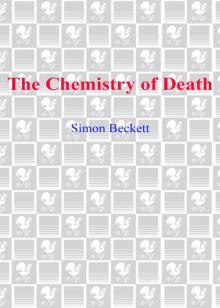 The Chemistry of Death
The Chemistry of Death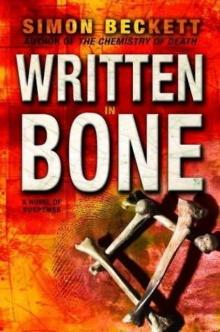 Written in Bone
Written in Bone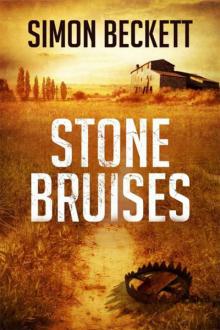 Stone Bruises
Stone Bruises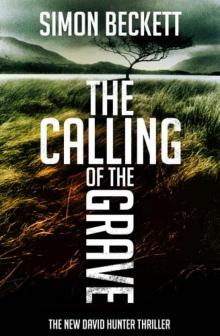 The Calling of the Grave
The Calling of the Grave Whispers of the Dead
Whispers of the Dead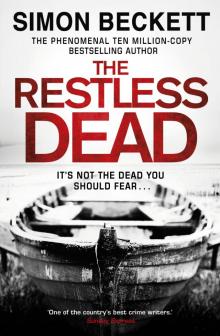 The Restless Dead
The Restless Dead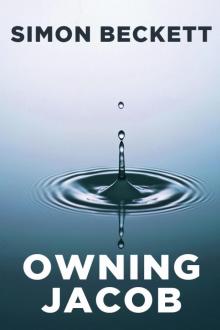 Owning Jacob
Owning Jacob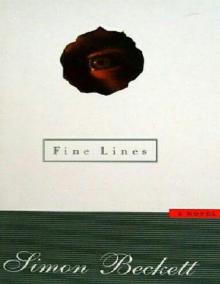 Fine Lines
Fine Lines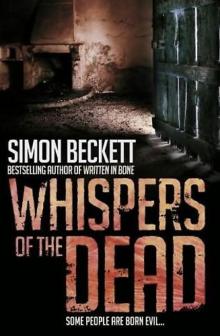 Whispers of the Dead dh-3
Whispers of the Dead dh-3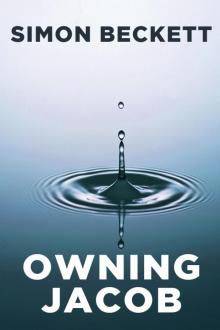 Owning Jacob (1998)
Owning Jacob (1998)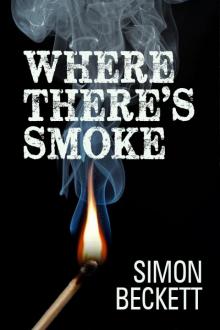 Where There's Smoke (1997)
Where There's Smoke (1997)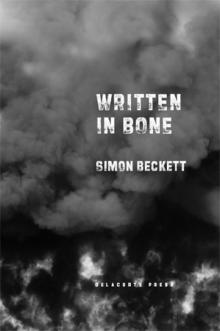 Written in Bone dh-2
Written in Bone dh-2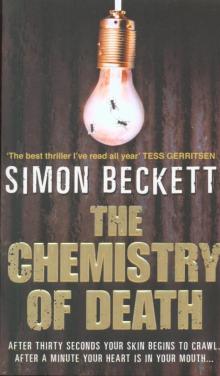 The Chemistry of Death dh-1
The Chemistry of Death dh-1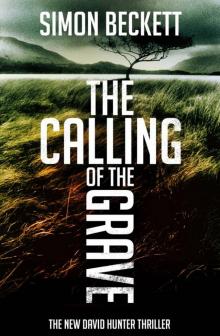 The Calling Of The Grave dh-4
The Calling Of The Grave dh-4